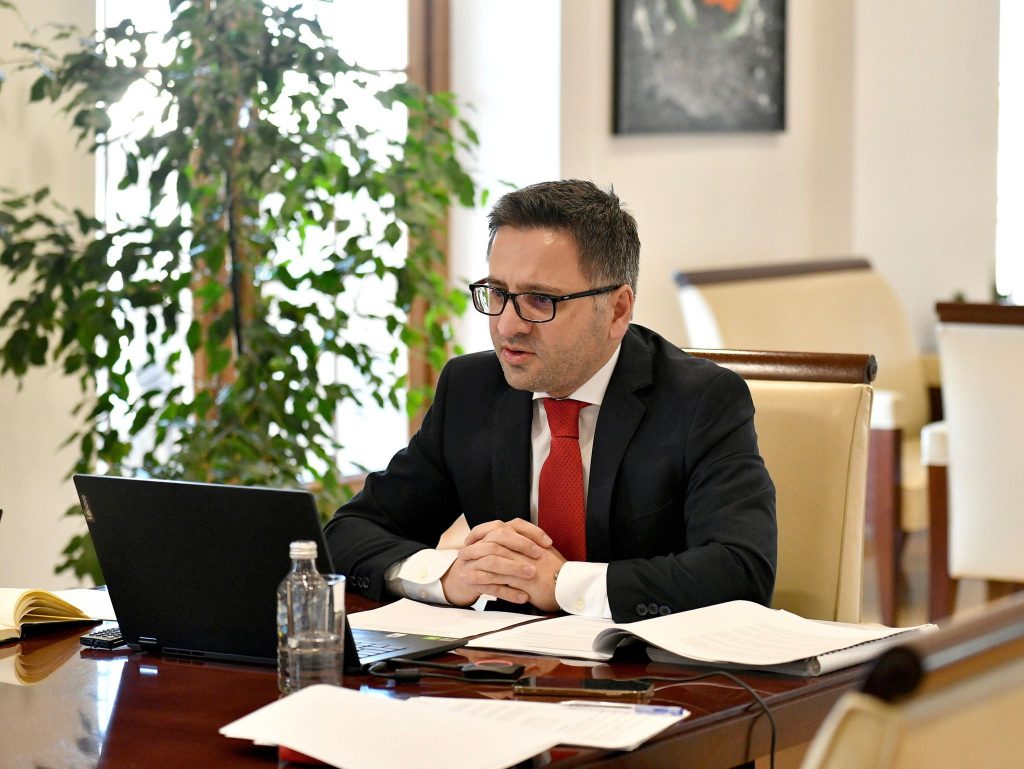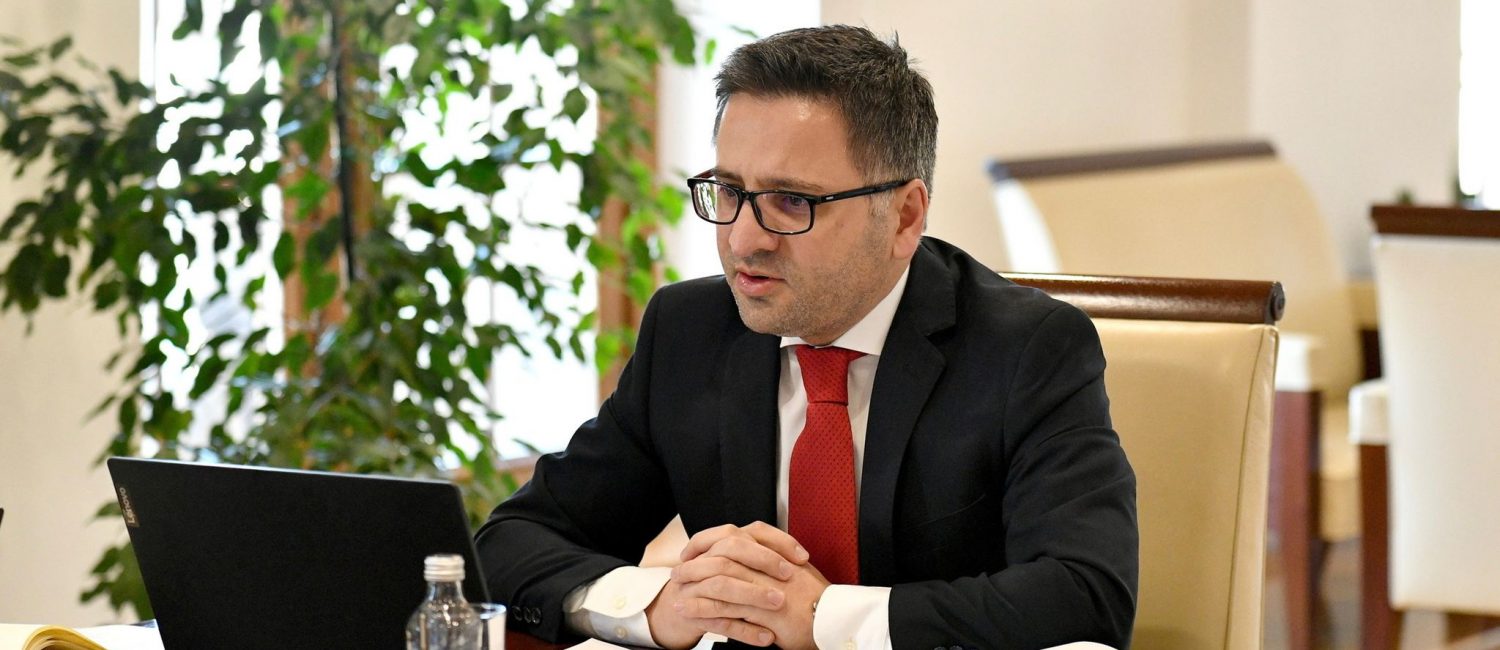9th March 2022, Skopje – The stability of the denar exchange rate is guaranteed. The financial system is also stable and is ready to respond to the challenges that could result from the Russian-Ukrainian conflict, same as in the entire pandemic period it manages the risks successfully. All financial services are provided and will continue to be provided, in accordance with the needs of the citizens and the corporate sector. The competent regulators monitor the situation in a coordinated manner and are ready to act fast, to adjust the policies in accordance with the developments and to maintain the financial stability, which is a priority.

These are some of the conclusions from today’s session of the Financial Stability Committee, at which the participants discussed the latest developments in the financial sector in the context of the current geopolitical developments, related to the military conflict in Ukraine. The session was chaired by the Governor of the National Bank, Anita Angelovska Bezhoska, and was attended by the Minister of Finance, Fatmir Besimi, the Chairwoman of the Securities and Exchange Commission (SEC), Nora Aliti, the Chairman of the Board of Experts of the Agency for Supervision of Fully Funded Pension Insurance (MAPAS), Maksud Ali and the President of the Council of Experts of the Insurance Supervision Agency (ISA), Krste Shajnoski.
At the session, it was pointed out that from the very beginning of the Russian-Ukrainian conflict, the situation is carefully monitored and is constantly assessed. Since it is a non-economic shock, whose future development is difficult to foresee, it is too early to draw conclusions about the long-term influences on the domestic economy. However, what is certain is that so far there are no pronounced direct influences on the domestic financial sector and there are no expectations for such influences, due to the very weak financial links with Russia and Ukraine. An additional factor is the absence of capital from these two countries in the domestic banking sector. This is an important advantage in these circumstances, especially if one takes into account the challenges faced by some of the neighboring countries in which Russian banks were present.
The Minister of Finance, Fatmir Besimi, pointed out that the past world economic crises – the global financial crisis and the economic crisis caused by the pandemic, taught us that the sound financial system can absorb part of the external shocks. Hence, the good coordination between the financial regulators is important, in order to closely monitor the situation and take appropriate measures and policies.
“Fiscal policy will be set in that manner, so it can absorb the future external shocks for the domestic economy and for the citizens’ standard, through appropriate measures and policies. They will come through the European economy and will mainly reflect on consumption, through the price pressures from the imported primary products. Through the fiscal policy we will make an effort for the citizens and the economy to lower those pressures. A set of anti-crisis measures has already been prepared, which will be presented by the Government soon”, Besimi said.
The Governor Angelovska Bezhoska pointed out that the foreign reserves are at a high level, which guarantees the stability of the denar, while the domestic banking sector is safe, liquid and adequately capitalized, ready to deal with possible shocks.
“During the corona-crisis, the banking sector showed that it can mitigate the risks, even when they are new and so far unseen, by both proportion and by characteristics. The banking sector showed that it is able to support the economy also in complex conditions and to meet the requirements of the citizens and the corporate sector. According to all indicators, such capacities are maintained and are further strengthened in this period.” – said the Governor Angelovska Bezhoska.
She added that the EC Decision is also a confirmation of the appropriate policies, which assesses that the banking regulations and supervision conducted by the National Bank are in accordance with the EU standards, which are met only by 26 countries in the world.
Referring to the situation on the Macedonian capital market after the escalation of the Russian-Ukrainian conflict and the challenges it imposed, the Chairwoman of the SEC, Nora Aliti, emphasized that they had an initially negative impact on the stock exchange trading, accompanied by a one-time fall of 8.39% in the MBI-10 on the stock exchange day when the military activities began, until the normalized and standard trading, without a dramatic sign. As of February, the net value of the open-end investment funds decreased by 2.4% compared to January. Inflows are stable, while outflows slightly increased (7.34%). Such indicators for the funds belong to the standard dynamics and there are no significant deviations from their condition. Given that the value of the investments in securities from Russian companies is about Euro 1.5 million, or 0.76% in the total net value of all open-end investment funds, such a proportion of an unfavorable influence is also expected, said the Chairwoman of the SEC.
The Chairman of the Board of Experts of MAPAS, Maksud Ali, emphasized that during the health-energy crisis and the current geopolitical developments, the fully funded pension insurance acts in a stable and transparent manner with identified risks which are analyzed and controlled on a regular basis and in the regulations, with special attention to the investment of the pension funds’ assets. As a result of the new situation, MAPAS also carefully monitors the reaction of the pension companies in relation to their investment strategies and policies for achieving the highest return, only in favor of the members of the pension funds.
The President of the ISA, Shajnoski, pointed out that the insurance market in 2021 registered a significant growth of 15%.
“What is even more important is that the insurance companies hold capital that is higher by four times than the required amount of the solvency margin, which confirms the high solvency of market entities. The conservative policies and the regulations for valuation of the technical reserves and the investments of the assets, as well as the high quality of the instruments that are included in the calculation of the capital of the insurance companies, are a good basis and guarantee for the preservation of the solvency. The growth in the gross written premium also caused an increase in the expenditures, i.e. an increase in the payments of claims and in the operating costs. This contributes to deteriorating the financial performances. The unfolding of the events in Ukraine does not affect adversely the insurance market, because in terms of risk management, we are not exposed directly to risks from Ukraine, neither on the liabilities side, nor on the assets side”, Shajnoski says.
At the session, it was pointed out that all financial regulators will continue with coordinated monitoring of the situation and timely exchange of all relevant information and that they are ready to respond in an appropriate manner to the developments, each within the competences of their mandate. It was concluded that all financial system regulators have a sufficient range of instruments they can use if necessary, which guarantees that the financial stability will be maintained also in the following period.
















